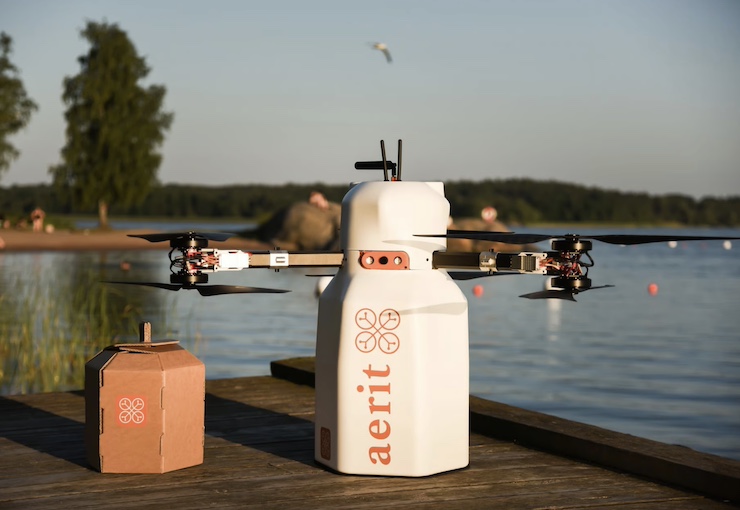
Another country – another drone delivery service. This time it’s Sweden, and the drone service is a three-way partnership. The players are all Swedish companies: Tele2, a mobile connectivity firm; Foodora, a restaurant and grocery delivery company; and Aerit, a delivery drone manufacturer. Together, they’re planning to make food deliveries in Värmdö, a suburb outside Stockholm, starting in May.
That’s for starters. The next stage will be groceries, general store items and medicines from pharmacies and hospitals; the three players then hope to serve Stockholm proper – and eventually go nationwide.
It’s a familiar story.
If there’s a novel element, it’s the use of 5G connectivity, which will allow the team’s drone, dubbed the NIMBI, to enjoy consistent signal communication with its remote pilot center and to report data and area visuals in real time with little to no latency. Not every drone delivery company can offer this same performance and safety guarantee.
There’s also the NIMBI’s rather unique rotary configuration. Not a hexacopter in the traditional sense, but its flight depends on six weatherproof motor/propeller units, arranged in three sets of two, each attached to a separate arm of the aircraft. The drone can carry a maximum load of 4 kg (or 8.8 lb) which is heavier than most of the package delivery drones currently on the market.
NIMBI flies up to 12 km (7.5 miles) when fully loaded but can reach 21 km (or 13 miles) when empty – a range exceeding that of many of its counterparts.
Another novel – though rather gimmicky aspect – is the physical design of the NIMBI fuselage. It’s essentially a large milk can or carton, which hardly seems aerodynamically efficient. But it does give the NIMBI a distinctive look – and a rather “old-timey” appeal. (It may remind some customers of an era when milk was delivered to their doorstep).
Aerit, NIMBI’s designer, is a young firm – but certainly no newbie. The company completed its first commercial drone deliveries back in 2021 and has full regulatory approval from EASA, Europe’s FAA. That means it could easily begin flying the NIMBI outside of Sweden, and indeed, across the EU.
For now, though, Aerit’s sticking close to home, hoping to build up its track record one suburb at a time.
Still, in one sense, Aerit has decided to cast its net wide. Rather than work with a single store outlet or chain, it’s opted for a broader on-demand model. In theory, any business in the Stockholm area will be free to have a NIMBI deliver its goods to customers who are residents of Värmdö – a population of roughly 10,000 people. That arrangement guarantees more business but could prove challenging over time – indeed, a nightmare – without flexible logistics and a larger multi-purpose fleet of NIMBIs capable of operating at scale, already in place.
Aerit has faced – and surmounted – growth challenges before. North of Stockholm, in another suburb, the firm’s trial run with a supermarket chain in 2022 proved difficult, largely due to the extreme cold and snow, which required some design changes. Many other European countries face similar weather obstacles; in others, heavy winds and rain can hamper drone deliveries.
Alexander Perrien, Aerit’s CEO, says he’s optimistic about his company’s expanding capabilities and partnerships. More seed money is pouring in from investors excited about the company’s future, not only in Sweden but across the continent.
“We are thrilled to join forces with Foododrs and Tele2 to accelerate the adoption of drone delivery across Europe,” he said last week.
|